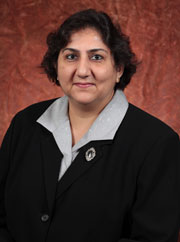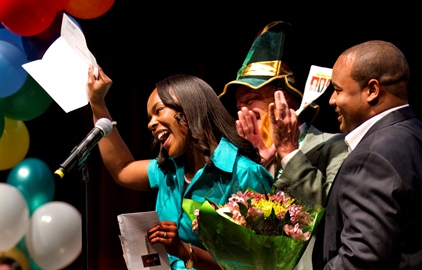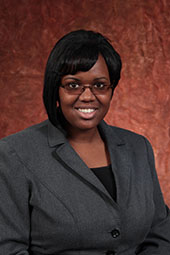CONTACT: Angela Lynn, The Jim Moran Institute for Global Entrepreneurship
July 5, 2012
THE JIMMORAN INSTITUTE FOR GLOBAL ENTREPRENEURSHIP
AWARDS COLLEGE OF MEDICINE GRAD $5,000 GRANT
New Doctor To Market, Develop Medical Technology Products
TALLAHASSEE, Fla. — The Jim Moran Institute for Global Entrepreneurship at Florida State University has awarded a Genivia Student Business Grant for $5,000 to recent Florida State graduate Dr. Francoise Marvel for the mobilemedical-technology products she developed, the Madruga Marvel Medical BlackBook application, book and e-book.
“Thanks to the generosity of Genivia Inc. and the hard work and entrepreneurial spirit of Dr. Marvel, an innovative business focused on producing medical products to improve the standard of health care will be realized,” said Randy Blass, an associate in organizational behavior and director of The Jim Moran Institute in Florida State’s College of Business.
“I am thankful to Genivia for their generous funding support of my technology startup, DocTechMD LLC, and their commitment to support technology insights and innovative entrepreneurial students at Florida State,” said Marvel, now a first-year resident at Georgetown University Hospital/Washington Hospital Center in Washington, D.C. “With Genivia’s support, I will continue to revolutionize the way physicians learn, train and manage patients’ health through technology innovations.”
As a third-year student at the Florida State University College of Medicine’s regional campus in Orlando, Marvel quickly realized the need for medical students to have critical information at their fingertips. Like most medical students, Marvel made case notations in a notebook as she worked rounds, but she found it time-consuming and unorganized.
In 2010, Dr. Mario Madruga, a professor at both the FSU College of Medicine and the University of Central Florida College of Medicine, gave Marvel access to his “little black book” filled with the medical information he had gathered since 1993. With Madruga’s permission, Marvel published an electronic version of the book. Marvel’s idea came to fruition as the Madruga Marvel Medical Black Book application, book and e-book.
Marvel divided this wealth of medical knowledge, best practices and expertise into four concise chapters:
Differential Diagnosis — uses symptoms, medical history and risks factors to determine possible diagnoses.
Mnemonics — memory aids to assist medical students with vocabulary and recall using acronyms and catchy phrases.
ClinicalPearls of Wisdom — quick tips and facts grounded in years of medical experience.
ClinicalCases — real-world examples including symptoms, diagnosis and treatment of patient cases.
Marvel also included a notes section for users who wish to expand the content using their own medical experiences and knowledge.
The application is available at iTunes; the book and e-book are available at Amazon.com and Lulu.com. The application and e-book are compatible with the iPhone, iTouch and iPad.
Marvel earned a Doctorate of Medicine from Florida State in May 2012. She plans to use the funds from the Genivia grant to establish her new business, DocTechMD. Marvel’s business plan includes marketing the Madruga Marvel Medical Black Book to the health care industry and developing new mobile medical-technology products for consumers. Her consumer-friendly educational products will include information on medical procedures, diagnosis and treatment, which she hopes will help to improve efficiency between patient-provider interactions and reduce medical errors.
The grant is provided by the Genivia Fund for Entrepreneurship, created by Genivia Inc., a Tallahassee-based software company. In 2011, Genivia pledged $50,000 a year for three years to benefit undergraduate and graduate students who engage in entrepreneurial activities at The Jim Moran Institute or the InNOLEvation Accelerator, a student business incubator, in the FSU College of Business. In addition, outstanding students across the Florida State campus who focus on entrepreneurship involving computers, information technologies or other innovative technologies are eligible for individual grants of up to $5,000.
About The Jim Moran Institute for Global Entrepreneurship:
The Jim Moran Institute in the College of Business at Florida State University was established in 1995 through donations from automobile-industry legend Jim Moran, his wife, Jan, and JM Family Enterprises Inc. and were supplemented with a major grant from the state of Florida to create a fully funded endowment and additional funding from The Jim Moran Foundation Inc. The mission of The Jim Moran Institute is to cultivate, train and inspire entrepreneurial leaders in the community through world-class education programs and curriculum, intensive consulting assistance and mentorship to entrepreneurs and business owners, leading-edge academic research and applied education and public recognition. For more information about The Jim Moran Institute, visit www.jmi.fsu.edu.
###




